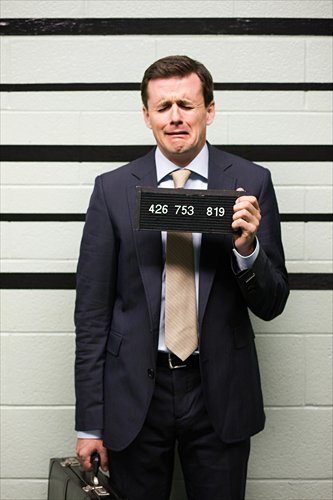Experts warn foreigners to avoid situations where they might run afoul of China’s work laws

Foreigners who seek jobs in China should be careful not to find themselves on the wrong side of the law. Photo: IC
Wilkins (pseudonym), an American who works in marketing in Beijing, had one of the most peculiar experiences in China in 2013.
A few days after his visa agent mailed his passport to him from Nanjing, Jiangsu Province, the agent called and told him not to cooperate with the police if they called. Then the police called.
"Of course I didn't want to do anything illegal. The police said they wanted an interview," said Wilkins, who was working at a Beijing-based company at the time.
All nervous and scared, Wilkins went with a Chinese friend who would be his translator. They met the police officer from Nanjing at a hotel in Beijing. When they arrived, another foreigner was leaving the room.
"I guess he was doing an investigation about the company that I got my visa from," he said. "[The officer told me] I wasn't in any trouble. He said he wasn't trying to arrest any foreigners but rather to catch this guy who was issuing illegal visas from Nanjing."
Wilkins provided the information he knew, which was very limited since he didn't meet the man in charge of the company.
He said the investigator intercepted a few passports before their visas were fully processed and confiscated them as evidence which meant they wouldn't get them back.
"I was lucky; mine was finished two days earlier," he said. "[The officer said] I should get the proper visa and that he knows half of the foreigners here have the wrong visas."
The officer was right. Wilkins should have had a work visa, but his company got him a business visa through the agent.
As more foreigners flock to China to explore opportunities, the issue of foreign nationals working illegally in the country has come to the fore, aided by media reports of teachers, models, nannies, and other foreign professionals who violate China's laws. Experts warn foreigners to avoid situations where they might end up working illegally in the country.

Recent news reports about illegally employed foreign workers have made the issue a hot topic in China. Photo: IC
Shifty practices
Now that he has sorted things out and has the correct visa, Wilkins, who has been living in China for five years, said he was "actually on some sketchy visas for my first couple of years in China."
He came to China on a one-year tourist visa in 2010, which meant that in order not to overstay the visa he had to leave the country when it expired. "The company that hired me didn't bother getting a work visa for me. They said I can use a tourist visa, and they can get me time off every time I needed to leave the country."
In 2012, when Wilkins was in between jobs and on an M visa (issued to persons who come to China for commercial trade activities), the agent from Nanjing told him that he had to fly down to Haikou in Hainan Province at the south end of the country.
"I met a guy in a hotel room who I had never met before, and I gave him my passport. The next day we went to the visa office to apply for the visa. Then I had to take a train all the way back to Beijing. And then they mailed me the visa later," he said. "I guess I had to go to Haikou because the company's connections were there."
But the almost 3,000-kilometer long train ride wasn't the end of Wilkins' adventure. A few months later, he got caught up in the visa agent investigation.
When asked why the company provided him with the wrong visa and used a suspicious agent, Wilkins said he thinks "they were just lazy."
"I think lots of companies do it, and foreigners, especially those who are new to China, don't know," he said. "I think very few foreigners come here with the intention of breaking visa laws, they assume that the company knows the law and trust the company."
Another possibility, said Wilkins, is that when the foreigner is a freelancer, or trying to switch jobs or work on their own, they might use agents that are in the gray area.
The situation is not uncommon among expats, especially when there are disputes with the original employer refusing to sign the release form, or the new employer is not sure what to do.
"It's hard to avoid [using shady agents] because many human resources (HR) departments are incompetent and don't know how to do the paperwork for foreigners. Now that I'm on the correct visa, I still have to do almost everything myself because HR has no idea [how to process a work visa]."
Wilkins added that the system is not applicant-friendly. "It's not very complicated once you understand it, but it's certainly not straight forward or clearly explained," he said.
Bending the rules
Joe Castillo, CEO of Nations Abroad LLC Human Resource company, which has been processing visa applications for foreigners working in China for six years, told Metropolitan that it is common for foreigners to do the "Hong Kong run."
Since a lot of Chinese companies and potential foreign employees would both prefer to meet face to face before signing a contract, he said, usually, expats first come to China on a tourist visa to do interviews and job hunt. "At that point, they have access to the country to process the work visa."
"[Because] flying back to the US, the UK or Australia would be very expensive, the fastest and easiest way to go would be through Hong Kong [for our clients]," Castillo said. During that time, his company would process the visa on their behalf.
He said foreigners being fined, detained or deported for working on a tourist, student or spouse visa, happens frequently.
Some of the situations are quite hard to solve. "For example, the wives of some businessmen here, who are stay-at-home moms, and are skilled and educated. They want to do some part-time jobs. But technically it's illegal because their visa doesn't allow them do any type of job," said Castillo.
And some can't get a work permit because of the size of their company.
"According to the law, you have to have 10 people working for your company before you are able to sponsor foreign employees for a work visa," he said. Applicants are also required to associate their visa with one work location, and working at other location can get them into trouble, Castillo added.
With the laws being "so stringent," a lot of schools, training centers, and kindergartens might end up "bending the rules" and hiring foreigners illegally, according to Castillo.
He believes work permits for people without work visas should be easier to access and apply for, be submitted and granted. "There should be programs for people who want to come here, to travel for a few months and maybe get a work permit."
Hoping for changes
The new Exit and Entry Administration Law that went into effect in 2013 explicitly stated that foreigners will be considered unlawfully employed when they work in China without obtaining work permits or work-type resident permits, or beyond the scope prescribed in their work permits.
While working on a tourist or business visa is no secret, and not uncommon among expats, it can lead to serious trouble. The Chinese government has gone to great lengths to crack down on the "sanfei (the three kinds of illegal statuses)" - foreigners who illegally enter, illegally stay and illegally work in China.
Efforts to reach the Exit and Entry Administration under the Beijing Municipal Public Security Bureau by press time were not successful.
According to Wang Dong, founder of Royal Law Firm in Shenzhen, Guangdong Province, it is very possible for a foreigner to unknowingly become a victim of unlawful arrangements and violate the work law.
The firm's primary clients are foreigners and foreign businesses in China. Visa-related issues, tax, labor contracts, and property acquisition are among the legal matters most frequently handled by the firm.
The matter most inquired about is work visas, he told Metropolitan.
"Many foreigners in China find themselves in situations boardering on breaking the law," he said.
"As far as I know, many would use an F visa (issued to persons who come to China for exchanges, visits, study tours or other relevant activities) while they are actually working on a long-term basis here, such as in consultation, tutoring or trade."
Fines and deportation are the two major punishments for illegal overstaying, Wang said.
He suggested that making the system easier to maneuver for foreigners would be a good step in decreasing these kinds of violations.
Meanwhile, for foreigners who are worried about their visa situation and want to avoid working unlawfully, Wang advises them to monitor the every step process themselves or make sure the agent they use has proper business qualifications.
He also said that regardless of whether they used an agent, foreigners should familiarize themselves with visa-related regulations and procedures as much as possible.
"There are a few very professional websites with such information nowadays," he said. "They even have detailed lists of what documents are needed and what to look out for."
"The first thing is to make sure you do your job interview at the company location so that you will be able to check the licenses on their wall. And when they apply for a work visa on your behalf, make sure the information they give on the application matches their license," Castillo said.
He said many companies that are not qualified to sponsor work visas for foreigners might use another company to process their employee visas. And when the police see conflicting information, the foreigner will be punished, which happens a lot.
"If you use an agent, go to their office and check the license on their wall too," he said.
Newspaper headline: Visa trap